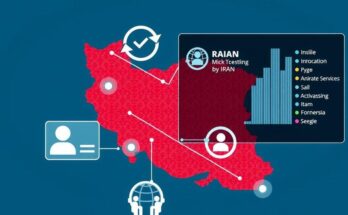Maldives President Mohamed Muizzu is on a five-day visit to India, aiming to repair bilateral relations following periods of tension after his pro-China election. The discussions with Indian Prime Minister Modi are expected to cover various significant issues as both nations navigate their geopolitical landscape and manage foreign influence in the region.
On Monday, Maldives President Mohamed Muizzu embarked on a five-day official trip to India, receiving a warm reception as he seeks to restore the delicate diplomatic relations between the Maldives and India. This visit marks a significant step as President Muizzu, who assumed office a year ago, made a commitment to remove Indian military personnel stationed in the Maldives as part of a nationalist platform. Discussions between President Muizzu and Indian Prime Minister Narendra Modi are anticipated to encompass a range of bilateral, regional, and international subjects that hold mutual significance for both nations. During his visit, President Muizzu is set to engage with various senior Indian officials to foster dialogue and cooperation. The tensions that have arisen between the two countries stemmed from Muizzu’s pro-China stance, which he maintained leading up to his election, notably promising to withdraw Indian soldiers and reduce reliance on India for critical imports, including healthcare and medicines. The diplomatic atmosphere appeared to shift positively when President Muizzu attended Prime Minister Modi’s swearing-in ceremony for his third term in June. Since this event, there has been an observable warming of relations between the two countries, highlighted by increased official communication. India’s External Affairs Minister, Subrahmanyam Jaishankar, expressed hope that the discussions would inject a new momentum into the historically friendly ties. The Maldives remains a point of contention in the regional influence struggle between India and China. Throughout the years, India has been a critical partner in the Maldives, providing development assistance and infrastructure support, while the Maldives has engaged with China’s Belt and Road initiative aimed at expanding its global reach. President Muizzu’s initiative to enhance ties with India is vital, especially amidst a shifting political landscape in the region, characterized by the rise of pro-China leadership in neighboring countries. The Maldives, facing significant foreign debt, has signaled no intent to pursue an International Monetary Fund bailout, further underscoring the importance of maintaining strong relationships with influential regional partners. During his visit, President Muizzu extolled the significance of his country’s historical relations with India, remarking on the deep-rooted connections between the two countries that have developed over centuries. His statements reflect a commitment to managing this relationship carefully, ensuring that the Maldives does not tip the balance of power in the region towards China. As the Maldives continues to navigate its geopolitical positioning, the outcome of President Muizzu’s visit to India will be closely scrutinized by international observers anticipating the evolving dynamics between these two strategically significant nations in the Indian Ocean.
The Maldives’ relationship with India has historically been one of close cooperation, underscored by India’s role as a primary development partner. However, recent political shifts within the Maldives, particularly the election of pro-China President Mohamed Muizzu, have strained this relationship. Muizzu campaigned on a platform that included withdrawing Indian military presence and reducing economic dependence on India. This backdrop highlights the importance of diplomatic engagements between Muizzu and Modi, as both nations seek to realign their interests within the context of regional power dynamics, particularly with China’s growing influence in the Indian Ocean region.
In summary, President Mohamed Muizzu’s visit to India is pivotal in mending the intricate ties between the Maldives and India amid shifting geopolitical landscapes. This engagement seeks to address bilateral concerns while reaffirming the historical relations that bind the two nations. The forthcoming discussions between the leaders are expected to facilitate a reconciliation of interests, fostering stability and cooperation in the region, which is crucial given the rising influence of China in adjoining territories.
Original Source: www.livemint.com




